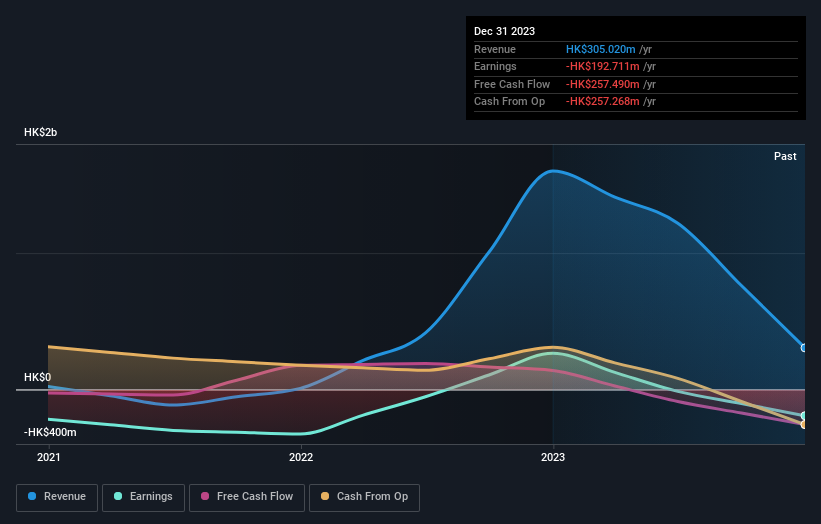
Key Insights
- Significant insider control over China Cultural Tourism and Agriculture Group implies vested interests in company growth
- 56% of the business is held by the top 2 shareholders
- Insiders have sold recently
If you want to know who really controls China Cultural Tourism and Agriculture Group Limited (HKG:542), then you'll have to look at the makeup of its share registry. The group holding the most number of shares in the company, around 66% to be precise, is individual insiders. In other words, the group stands to gain the most (or lose the most) from their investment into the company.
Despite recent sales, insiders own the most shares in the company. As a result, they stand to gain the most after the stock gained 15% in the past week.
Let's take a closer look to see what the different types of shareholders can tell us about China Cultural Tourism and Agriculture Group.
View our latest analysis for China Cultural Tourism and Agriculture Group

What Does The Lack Of Institutional Ownership Tell Us About China Cultural Tourism and Agriculture Group?
Institutional investors often avoid companies that are too small, too illiquid or too risky for their tastes. But it's unusual to see larger companies without any institutional investors.
There could be various reasons why no institutions own shares in a company. Typically, small, newly listed companies don't attract much attention from fund managers, because it would not be possible for large fund managers to build a meaningful position in the company. It is also possible that fund managers don't own the stock because they aren't convinced it will perform well. Institutional investors may not find the historic growth of the business impressive, or there might be other factors at play. You can see the past revenue performance of China Cultural Tourism and Agriculture Group, for yourself, below.

We note that hedge funds don't have a meaningful investment in China Cultural Tourism and Agriculture Group. With a 38% stake, CEO Lijun Yang is the largest shareholder. With 17% and 9.6% of the shares outstanding respectively, Anfeng Huang and Kaijun Chen are the second and third largest shareholders.
To make our study more interesting, we found that the top 2 shareholders have a majority ownership in the company, meaning that they are powerful enough to influence the decisions of the company.
Researching institutional ownership is a good way to gauge and filter a stock's expected performance. The same can be achieved by studying analyst sentiments. As far as we can tell there isn't analyst coverage of the company, so it is probably flying under the radar.
Insider Ownership Of China Cultural Tourism and Agriculture Group
The definition of company insiders can be subjective and does vary between jurisdictions. Our data reflects individual insiders, capturing board members at the very least. Company management run the business, but the CEO will answer to the board, even if he or she is a member of it.
Most consider insider ownership a positive because it can indicate the board is well aligned with other shareholders. However, on some occasions too much power is concentrated within this group.
Our information suggests that insiders own more than half of China Cultural Tourism and Agriculture Group Limited. This gives them effective control of the company. That means they own HK$831m worth of shares in the HK$1.3b company. That's quite meaningful. Most would argue this is a positive, showing strong alignment with shareholders. You can click here to see if those insiders have been buying or selling.
General Public Ownership
The general public, who are usually individual investors, hold a 34% stake in China Cultural Tourism and Agriculture Group. This size of ownership, while considerable, may not be enough to change company policy if the decision is not in sync with other large shareholders.
Next Steps:
While it is well worth considering the different groups that own a company, there are other factors that are even more important. To that end, you should learn about the 4 warning signs we've spotted with China Cultural Tourism and Agriculture Group (including 2 which are potentially serious) .
If you would prefer check out another company -- one with potentially superior financials -- then do not miss this free list of interesting companies, backed by strong financial data.
NB: Figures in this article are calculated using data from the last twelve months, which refer to the 12-month period ending on the last date of the month the financial statement is dated. This may not be consistent with full year annual report figures.
Have feedback on this article? Concerned about the content? Get in touch with us directly. Alternatively, email editorial-team (at) simplywallst.com.
This article by Simply Wall St is general in nature. We provide commentary based on historical data and analyst forecasts only using an unbiased methodology and our articles are not intended to be financial advice. It does not constitute a recommendation to buy or sell any stock, and does not take account of your objectives, or your financial situation. We aim to bring you long-term focused analysis driven by fundamental data. Note that our analysis may not factor in the latest price-sensitive company announcements or qualitative material. Simply Wall St has no position in any stocks mentioned.
Have feedback on this article? Concerned about the content? Get in touch with us directly. Alternatively, email editorial-team@simplywallst.com